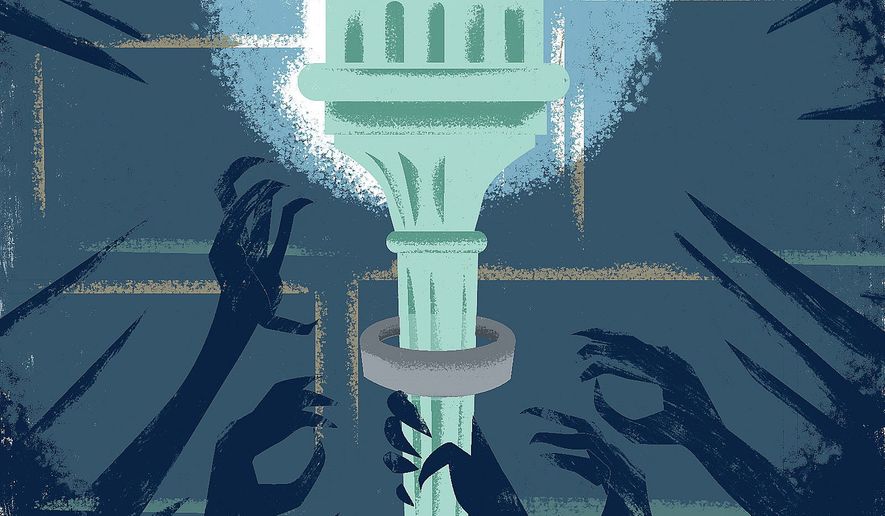OPINION:
Talk of the “deep state” is much in the air these days. To some, the deep state refers to what they see as a conspiratorial intelligence community leaking secrets. To others, the deep state refers to what they see as an out-of-control bureaucracy out to bury — or at least trump — President Trump’s initiatives.
I am not especially enamored of the “deep state” label or of overwrought conspiracy theories. And I don’t much take to hyperbolic bureaucrat-bashing or indiscriminate attacks on all federal regulations. Indeed, there are many regulations, especially in the health and safety areas, that serve important public purposes.
But surely there is a case to be made for the proposition that, as Chief Justice John Roberts put it in 2013 in his City of Arlington v. FCC dissent, “the danger posed by the growing power of the administrative state cannot be dismissed.” In that case, Chief Justice Roberts argued, on separation of powers grounds, that the deference regularly given by courts to statutory interpretations by federal administrative agencies — even to agency interpretations regarding their own jurisdictional boundaries — has led to an administrative state that “wields vast power and touches almost every aspect of daily life.”
Making the power-wielding all the more problematic is the fact that, in many instances, the same agency officials possess authority to promulgate regulations (a legislative function), police compliance with the regulations (an executive function), and adjudicate disputes brought to enforce the regulations (a judicial function). James Madison, famously wrote in Federalist No. 47 that the “accumulation of all powers, legislative, executive, and judiciary, in the same hands may justly be pronounced the very definition of tyranny.” No doubt, if he were able to contemplate today’s administrative state, he would turn completely over in his grave.
Examples of the wielding of such “vast power” by bureaucrats in the modern administrative state are fairly limitless, of course. Here, to illustrate, I want to discuss just one paradigmatic example of an agency rule subject to abuse — what the Federal Communications Commission calls its general “conduct” rule which it adopted in 2015 as part of a set of regulatory mandates to police the practices of internet service providers. This regulation prohibits internet providers from “unreasonably interfering” with or “unreasonably disadvantaging” either competitors or consumers.
You don’t need a degree in metaphysics — or in law — to figure out that these malleable terms don’t establish clear rules of the road. Rather they are so inherently vague that the FCC itself was not embarrassed in its official order to call the internet conduct rule a “catch-all standard.” And shortly after the conduct regulation was adopted, the FCC Chairman Tom Wheeler conceded “we don’t really know” what it means.
The rule-of-law and due process problems should be self-evident regarding a regulation the agency concedes is a “catch-all” and which the agency’s chairman admits he doesn’t know what it means. Such a regulation, which has the force of law, invites abuse and favoritism in its enforcement, an executive function, and in its imposition of sanctions, a judicial function. It’s more than a bit troublesome when the very same officials who adopt a vague regulation may then selectively initiate regulatory proceedings to sanction those they determine have run afoul of it. A Madisonian nightmare.
Lo and behold, not long after the FCC adopted the internet conduct regulation it initiated an investigation of the “free data” plans of Verizon, T-Mobile, and AT&T, supposedly to determine whether these offerings somehow “unreasonably” disadvantaged competitors. No matter that these innovative offerings, which exempt access to certain web sites from the carriers’ data usage caps, are very popular among consumers.
Fortunately, within days after Mr. Trump appointed him the new FCC chairman, Ajit Pai ordered the investigations terminated. A few weeks later, he proposed eliminating the conduct regulation, calling it “a roving mandate to micromanage the internet.”
Aside from offending rule of law and due process norms, a major practical problem with regulations like the FCC’s conduct rule — and there are many others like it still on the agency’s books — is that innovation is stifled when businesses are discouraged from experimenting. Service providers may wish to explore news business models that may meet evolving consumer demand by differentiating their services, but they may pull back because they fear having sanctions levied for crossing a vague line in a regulation the agency calls a catch-all.
In his monumental work, “The Constitution of Liberty,” F.A. Hayek observed, with regard to regulations, that “their over-all cost is almost always underestimated,” while “the prevention of new developments” is never fully considered. Certainly, Hayek’s critique applies to the FCC’s attempt to micromanage the dynamic environment inhabited by internet providers.
There’s no need to conjure up the “deep state” to justify worrying, along with Chief Justice Roberts, about “the growing power of the administrative state.”
• Randolph J. May is president of the Free State Foundation.




Please read our comment policy before commenting.